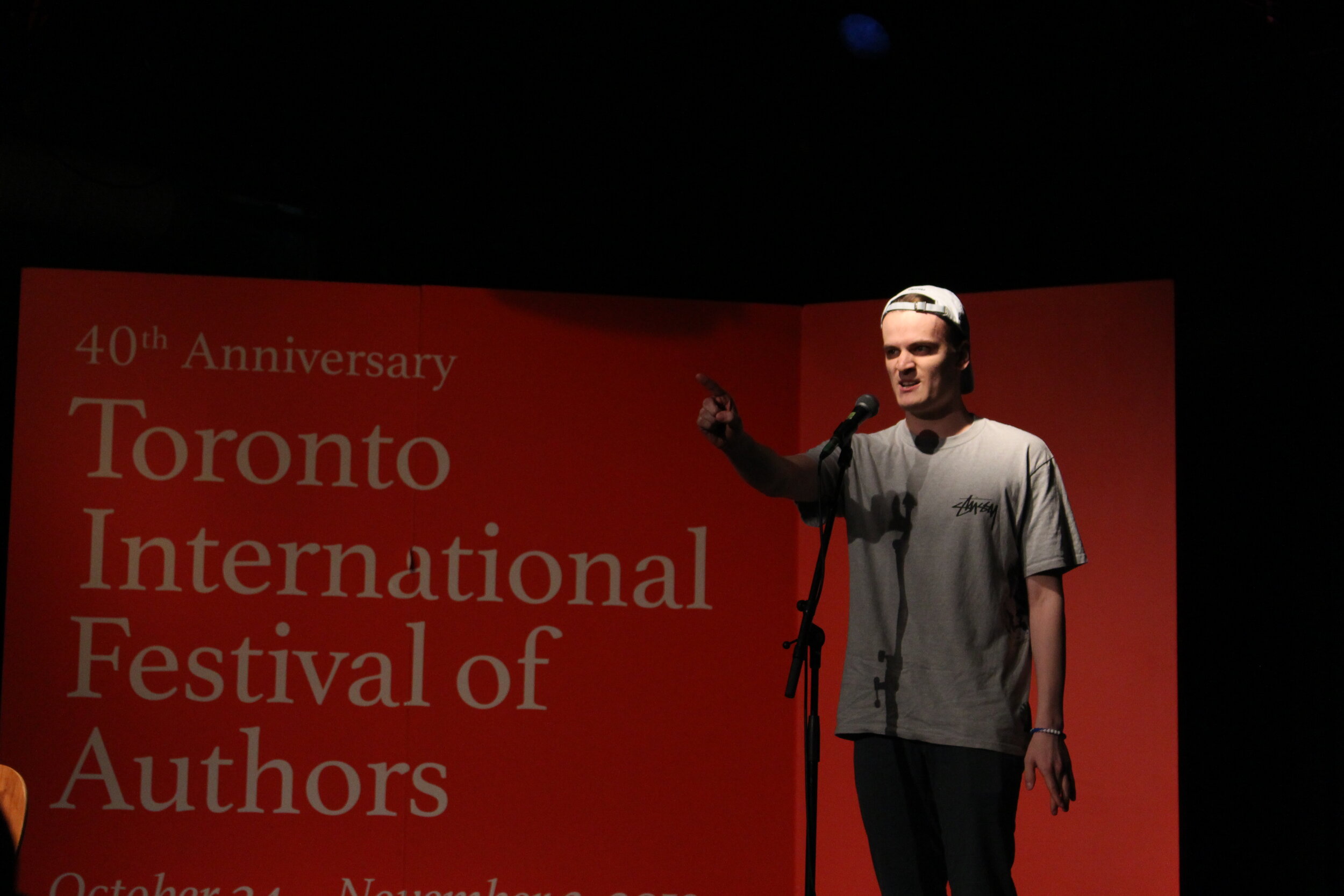By Mia Maaytah
Ian Keteku, 2010 World Poetry Slam winner at the Toronto International Festival of Authors on Oct. 25, 2019 at the Harbourfront Centre in downtown Toronto. (CanCulture/Mia Maaytah)
The 40th anniversary of the Toronto International Festival of Authors wrapped up their 11 day celebration on November 3 which featured over 100 Canadian novelists, journalists, and poets.
Midway through the festival on Oct. 25, the Harbourfront Centre in downtown Toronto hosted the annual poetry slam in partnership with Toronto Poetry Project that featured world renowned Canadian poet Ian Keteku and upcoming Toronto-based poets.
Twelve poets eagerly signed up to perform their best pieces in hopes of entertaining and exciting the audience, and that would also earn them a score high enough to advance to the second round of the competition.
Judges consisted of random audience members, handpicked by one of the event curators and chosen based on their answer to “what rules in life should be broken?” The curator explained the answers that both encompassed and denied cliches such as “rules should exist so they can be broken,” and even “the rule of J-walking should be broken.” Judges were instructed to rate performances on a scale of 1-10 and audience members were encouraged to verbally share their opinion on the scores given, whether positive or negative.
The lights dimmed and David Silverberg, the artistic director of Toronto Poetry Project and founder of Toronto Poetry Slam, began the show with a land acknowledgement, a trigger-warning, and spotlighting that an empty, wooden chair on stage was there to represent those who have been silenced and are unable or have been stopped from sharing their message.
David Silverberg beginning the Toronto Poetry Slam at the 40th Festival of Authors on Oct. 25, 2019. (CanCulture/Mia Maaytah)
As the poets took the stage, themes of race, gender, and sexuality were prevalent in many of the performed pieces, some comedic and satirical, others more serious and daunting.
Ian Keteku, 2010 World Poetry Slam winner and featured poet of the evening, spoke between rounds of the competition and shared poetry from his new anthology Black Abacus.
His words captured the audience as he moved between analogies about life passing us by quicker than our brains can comprehend it, and used his platform to speak on gun violence, throwing shade, and the constant injustices of modern racism.
Keteku shared a poem called “How To Kill A Poet” which addressed poet stereotypes and the ways in which their message and their work can be literally and figuratively destroyed.
Keteku spoke before the show about what drives his passion to speak and create works of written art.
“I like to explore things that are ethereal but have meaning in our everyday life. I like to offer words of hope and meditation. Sometimes they are critical of the world,” Keteku said. “There’s a lot of injustices. I speak about race, I speak about African people, I speak about indigenous sovereignty around the world. I speak about opening one’s heart for peace.”
Liam Galway, the winner of the competition who will be performing at the 2020 Festival of Authors, also spoke about the challenges of mental health and gender roles.
Liam Galway performing his first poem at the Harbourfront Centre in downtown Toronto on Oct. 25, 2019. His poem uncovered the topic of boys and all the ways society tells them not to dance. (CanCulture/Mia Maaytah)
His performance entitled “Distractibility,” began by spelling ADHD, and quickly turned into a rhythm of rhyming words and speaking in a pace to mirror the speed at which his mind seems to work.
“I wish I could say what goes on in my head. Numbers confuse me, letters amuse me, my memory’s shaky and my appetites choosy. But it has its upside as well,” Galway said.
“I can tell my mom I love her and say it differently every single day. I can write poetry for days, I can write essays, sometimes get A’s. I can take the mean things that some of my friends would say and turn them into songs and I’d sing along so their words wouldn’t hurt as much.”
It appeared as though no topic was off limits. From police brutality to stories of orgies, racism in small towns to sex on the beach, nothing was exempt from the mic.
The poets left the crowd joyfully amused throughout the show and seamlessly showcased their world of literary creativity and the importance of sharing a message, regardless of what it may be.
“The audience appreciates how, with even a very serious poem, there’s a power and an emotional energy running through the room once that final syllable hits,” Silverberg said. “Because poetry slams also emphasize performance, the audience recognizes they may also watch skilled performers as well as talented writers.”
“What keeps poets coming back to slam is the chance to showcase their work to a wider audience, since poetry slams are very well attended, and they may also like a competitive format to an open mic that also energizes and engages the audience, encouraging them to, say, boo scores they don’t like. Things run a bit different at a poetry slam.”







